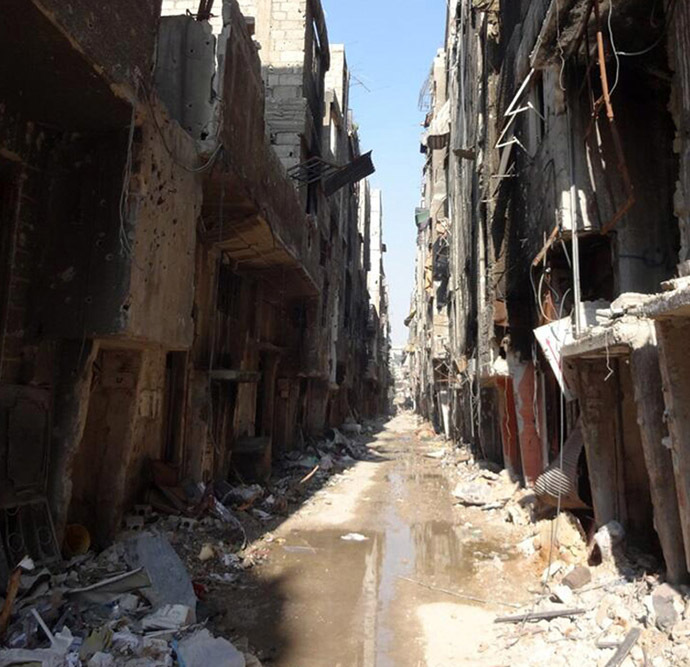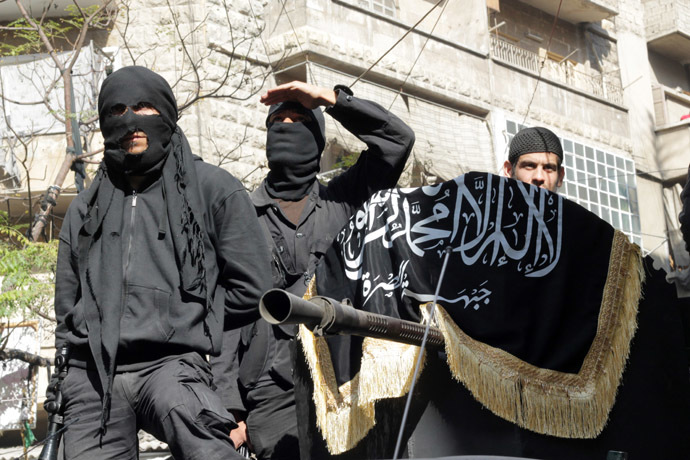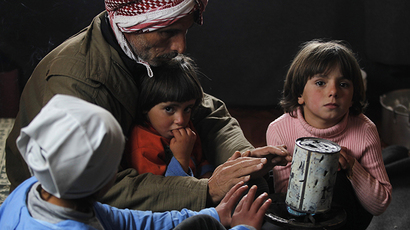‘We want to go out!’: 18,000 starving inside Syrian refugee camp
Mass starvation, disease and hopelessness abound in the Yarmouk Palestinian refugee camp in Damascus. Although a UN agency has managed to make its first food aid delivery to the rebel-held camp in weeks, many people are on the brink of starvation.
The camp is located on the edge of the territory the Syrian government considers under its control, in a southern Damascus neighborhood, just five miles away from the capital’s center.
Rebel forces have been holding the camp for more than a year and the army started a siege in June. Nothing and no one comes in or out, as 18,000 people continue to be kept in a state of limbo.
Some of the Palestinian refugees living in the camp have been there for decades, victims of the Palestinian people’s conflict with Israel. Now they are hoping desperately for a resolution to this conflict, in Syria.

RT made it as close as possible to the edge of the camp under government supervision, to observe as the UN Relief Works Agency (UNRWA), in league with Syrian and Palestinian authorities, delivers the much-needed food aid.
There were cases when people were let out to come back with supplies; but only women and elderly men. They knew they could not leave because their families continue to be trapped inside.
“It’s as bad as it can get, I’m desperately hungry...we have nothing to eat,” one woman told RT’s Maria Finoshina. There is no free passage deeper into the camp, as snipers are on the ready to shoot anyone who ventures in.
The UNRWA hopes it will be able to continue food deliveries. On Thursday, it managed its first delivery in two weeks, consisting of 1,000 food parcels – the biggest yet.
"The distribution is ongoing. This is the first aid to enter the camp since January 21, when UNRWA distributed 138 food parcels," UNRWA spokesperson Chris Gunness said.
Another convoy entered the camp Friday.
Speaking to Reuters, Gunness said that they hope “to continue and increase substantially the amount of aid being delivered... with each passing hour, their need increases.”
Even in this climate of desperation, versions as to what exactly is going on differ massively. So much so that Reuters claims that the UNRWA has knowledged that one of its latest convoys was fired upon by government forces determined to starve the Palestinian refugees. The same tune is being sung by opposition activists, claiming that the government is using hunger as a weapon.
Yarmouk families, meanwhile, continue to perish – and seem to be rather blaming the rebel forces.
“There is no food, nothing to eat or drink, the militants are inside,” one resident told RT. “I swear by the soul of the Prophet we want this to stop. What is our guilt? We want to go out!”
“We cannot leave – the militants prevent us,” another resident said.

A total of 85 people in the camp have died since June, and many fear the number will continue to rise if the aid situation is not restored and supplies do not start running normally.
The stalemate has been going on for months now, with no end in sight – despite the Palestinian authorities stepping in.
Palestinian ambassador to Syria Mahmoud Al Khaldi told RT that the authorities “are negotiating with the militants to convince them to go out. We tell them that this is of no importance and these are just people – they’ll not gain any strategic goal. We had three rounds of talks, but we failed. And I don’t think they’ll accept this – it’s clear.”
Sieges have been a tried and tested rebel tactic for three years now. Just outside Damascus, the town of Adra has been held since mid-December 2013, with 5,000 of those who did not flee in time held prisoner in their own homes and used as human shields, just in case the government forces decide to storm the town by force. They are now encamped just outside the town – but cannot storm it for fear of causing civilian deaths.
Anwar Raja, from the Popular Front for the Liberation of Palestine, sees the rebels’ tactics as an obvious move to insinuate the government’s complicity in the suffering of its own people.
“The Nusra Front and the Takfiri groups are trading on the hunger of the people. They want to say to the world: ‘See: the people are hungry.’ It’s like the residents are kidnapped inside their own camp, inside their own home, and the militants are negotiating over them, negotiating their souls,” Raja said.
“They claim that the Syrian state is besieging Palestinians in the camp. They want to invert the image and the truth, saying that the Syrian government is part of the killing force, as they don't do anything to protect the people. They want people to hate the regime.”
According to Raja, an evacuation plan has been worked out with the Syrian Arab Red Crescent to evacuate "hundreds" of Yarmouk residents. The evacuees were transported to several hospitals, the Syrian Observatory for Human Rights said Saturday, but the Red Crescent could not be reached to confirm the details of the operation.














